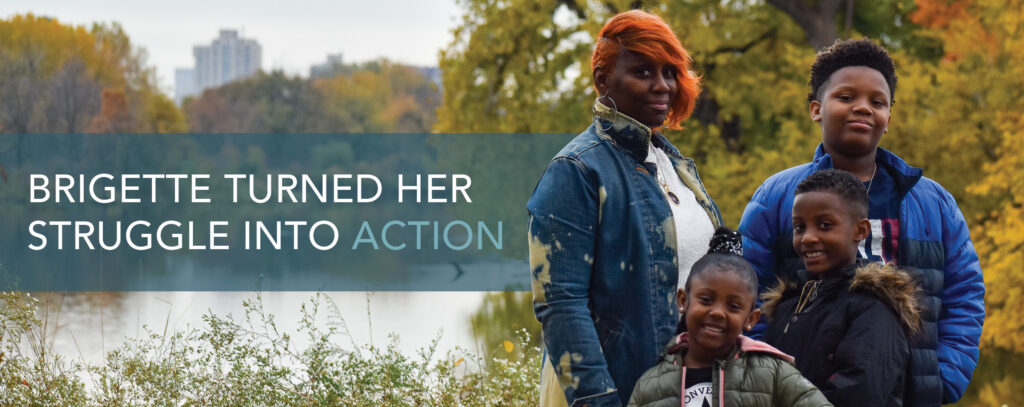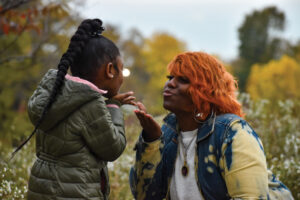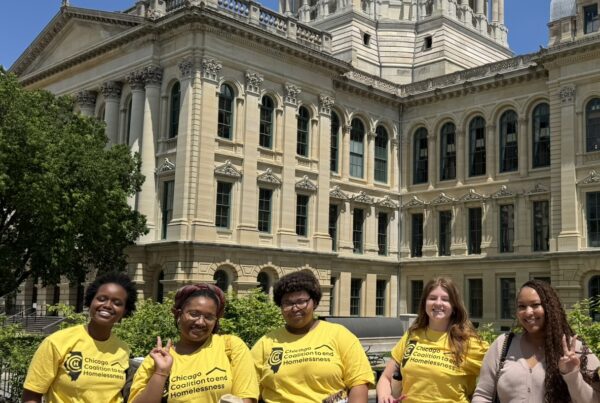
Brigette Barber was living in an apartment in the Englewood neighborhood with her family in 2015, when she learned that the property was foreclosed and the person she was paying rent to did not own the building.
The apartment was barely habitable, with a nearly collapsed ceiling, no heat, and a persistent rodent infestation. And after Brigette’s grandson Jamarius’ blood tests indicated a concerningly high lead level, they discovered lead paint.
Working for her family’s barbeque business and caring for her mother who had recently fractured her leg, Brigette could not afford the rent on another apartment.
The family spent the next couple of years staying wherever they could find refuge. Hotel rooms with all the grandkids sleeping in the double bed and Brigette and her adult daughters sleeping on mats on the floor. A car parked in a hospital parking lot for security, letting her grandson play videogames on her phone to distract him from the reality of the situation.
“I wasn’t embarrassed about being homeless, because there was nothing I could do about it,” Brigette said. “It was what it was. I only talked about it when it needed to be talked about.”
In September of 2017, Brigette went to her grandchildren’s school to fill out some paperwork. There she met a CCH community organizer, Hannah Willage.

At the time, CCH was working with the city of Chicago to conduct needs assessments on homeless families to determine their eligibility for a new housing program, Families in Transition (FIT).
The program, created through advocacy from our HomeWorks campaign, provided housing subsidies and support services to 100 of the highest need homeless families at six elementary schools on Chicago’s South and West sides.
Through the program, Brigette was able to move into a four-bedroom apartment in Englewood in March 2018 with her youngest daughter, Dajel, 21, and three grandchildren she is currently caring for ages 10, 8, and 5.
“It was such a blessing,” Brigette said of the housing she received through the program. “It changed our life tremendously.”
Since connecting with CCH in 2017, Brigette began volunteering as a grassroots leader on our education committee.
“She opened doors for me,” Brigette said of CCH community organizer Bisma Shoukat. “Whenever I needed help pertaining to schools, Bisma gave me names and someone to talk to.”
Brigette joined with CCH legal staff last fall to train Chicago Public Schools (CPS) Students in Temporary Living Situations (STLS) liaisons, on how to best support students and parents experiencing homelessness. The positive reception she received after her presentation boosted her confidence and motivated her to stay involved.
The pandemic has created a whole new set of challenges for the family. When the pandemic hit in March, Brigette was laid off from her job of more than two years as a cook with the Spirit of Chicago tour boat.
And helping her grandchildren adjust to remote learning was a struggle. But she turned her struggle into action.
This fall, Brigette was part of a group of grassroots leaders who, as parents or grandparents of school-age children with lived experience of homelessness, collaborated with the Illinois State Board of Education (ISBE) and the CCH Law Project to develop a guidance document on how to support homeless students through the pandemic.
“I just got myself more and more involved,” Brigette says of her time at CCH, “because I felt like if they changed my life, I can change somebody else’s life.”






